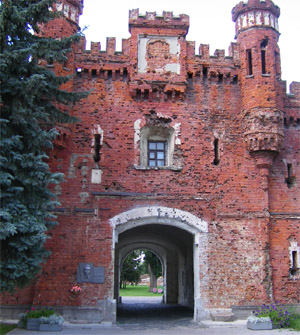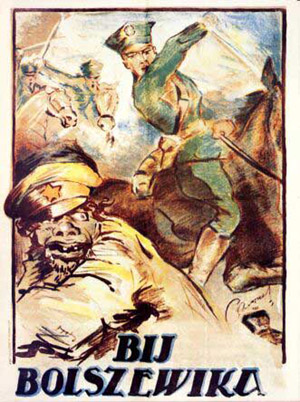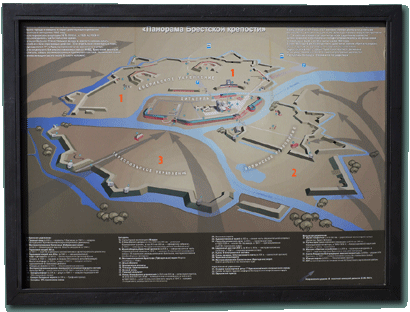 |
Brest Fortress
Brest, Belarus
|
|
 |
The region where the Bug and Mukhavets Rivers meet was originally settled by the Poles, sometime towards the end of the first millenium. The Kievian Rus tribe wrenched it away from its original inhabitants in 1019, and founded the city of Brest.
Between the town's founding and the end of the 18th century a veritable Who's Who of central European baddies paraded through Brest: Mongols, Lithuanians, Teutonic Knights, Crimean Tartars, Swedes and Muscovite Russians all rolled over Brest at one time or another, alternately burning, looting, taking over and being re-conquered, but somehow not completely grinding the city into a fine powder. How did a city continue to exist through all of that heroic galloping? |
 |
|
|
By the start of the 19th century, Russia was in control of the region and scared to death of the military powers that were Prussia and the Austria-Hungarian Empire. Russia built a series of fortresses along its western border, first a line of forts running from north to south through Poland, and next a few along the Bug River, which included what was then called the Fortress of Brest-Litovsk.
|
 Brest Fortress' front gate today Brest Fortress' front gate today |
 |
In 1830 Russian general K.I. Opperman designed the fort's first four-square-kilometer iteration, which was built from 1836 to 1842. Russia beavered away on it for the next seven decades, modernizing and adding outer fortifications that made the Brest Fortress cover 30 square kilometers by 1914.
Just in time for the Russian army to abandon the fort, arms aflail, in their withdrawal from Poland during the summer of 1915! The German army took possession the Brest Fortress in August of 1915 without a shot being fired.
The Germans departed at the end of the First World War (1914-1918), but the Treaty of Versailles (1919) that ended that war and defined the peace wasn't terribly specific about the borders of Poland and Russia. Polish Chief of State Józef Pilsudski (1867-1935), the man responsible for a country named Poland being able to exist after over a century of partition, figured the Treaty of Versailles'
|
|
|
vagueness made for an excellent opportunity to extend Poland's borders as far to the east as possible.
And extend those borders Poland did! Also taking advantage of the insanity that was engulfing Russia during its own civil war, Polish forces managed to push the Red Army out of most of the western Ukraine in 1919. Once the Bolsheviks gained the upper hand over the Whites in Russia, however, the Red Army pounded the Poles all the way back to Warsaw in 1920.
|
Bolshevism on the march westward unsurprisingly concerned a great many folks in the west. Great Britain started sending terse telegrams to Moscow, asking for an immediate ceasefire, lest Britain be forced to enter the fray on the side of the Poles...an empty threat, as the political situation in Great Britain at the time pretty much precluded the possibility of any sort of military action at the time.
Russia may have realized this, as they ignored the threat, but the Poles shortly kicked the Bolsheviks back into the Ukraine anyway, and everybody, exhausted, decided to pretty much go back to about where they started. Brest remained in Poland, and the Bolshevik dream of exporting revolution to the rest of Europe was derailed for the time being.
The Brest Fortress became known throughout Poland as a big ole nasty prison. In 1926, Polish premiere Wincenty Witos (1874-1945) was overthrown by that great Pilsudski guy, and was imprisoned at the Brest Fortress along with several other Polish bigwigs in 1930. At this point I would just like to say Wincenty Witos again. Wincenty Witos. |
 |
 A handsome, cultured Polish cavalryman smites a simian Russian soldier in a Polish propaganda poster: Smash the Bolshevik A handsome, cultured Polish cavalryman smites a simian Russian soldier in a Polish propaganda poster: Smash the Bolshevik |
|
In the opening days of the Second World War (1939-1945), the Fortress of Brest held out for four days against General Heinz Guderian (1888-1954)'s invading panzers. Shortly thereafter, the Soviet Union invaded Poland as well, and there followed what is certain to have been a fascinating sight: One of very few joint Nazi-Soviet Victory Parades, through the streets of Brest-Litovsk, on September 22 1939.
The question of course is, which group goose-stepped more convincingly? It seems to have been the Nazis, as the Soviet commander, Semyon Moiseevich Krivoshein (1899-1978), later wrote in his memoirs that he refused to let his troops march alongside the Nazis...not because of any sense of distaste, but because he was afraid his troops would look slovenly next to the perennially well-groomed Germans. Which they most certainly would have. And they probably couldn't goose step as goosily, either.
|
 The Brest Fortress' appearance in 1941, as displayed at the site The Brest Fortress' appearance in 1941, as displayed at the site |
 |
Russia took comfy control of Brest and its fortress after its fun of self-consciously cavorting with Nazis. The period of Soviet control of Brest-Litovsk saw thousands of Polish citizens of the city being deported to Siberia and Kazakhstan, and a great many executions.
This treatment was probably remembered fondly by Brest's remaining inhabitants once the Nazis turned on their Soviet allies in the summer of 1941, fought their way back through Brest, and proceeded to liquidate untold thousands of the city's jews.
The Soviets did hold out for six days against the German onslaught, a feat that later earned Brest Fortress the no doubt
|
|
much cherished title Hero Fortress, making it a symbol of resistance to German wickedness during the Great Patriotic War that was to follow.
Brest's twelve remaining citizens rejoiced as the Red Army returned in August of 1944 and liberated the city (there were really more than twelve). The Yalta Conference of February 1945 confirmed Russia's ownership of Brest, despite what were probably rather muted Polish howlings of disagreement. Poles were "encouraged" to leave Russian city of Brest for the next 20 years, and today they represent about 1% of the city's population.
Today, according to brestonline.com, Brest is a big economic and cultural center. It is also an important rail-way and auto-roadnode...which just happens to also have Belarus' first outdoor baseball stadium! An auto-roadnode and baseball! One imagines those Crimean Tartars wish they'd hung on to Brest.
|
|
|
|
|
|
 |




